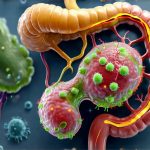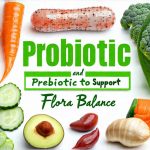Our digestive system is home to trillions of microorganisms – bacteria, fungi, viruses, and others – collectively known as the gut microbiota. This complex ecosystem plays a crucial role in our overall health, influencing everything from digestion and immunity to mental wellbeing. A key factor supporting a healthy gut microbiome isn’t necessarily about adding bacteria, but rather providing the right environment for beneficial bacteria to thrive. And one of the most important ways we do that is through dietary fiber.
Fiber, often thought of solely as aiding regularity, is far more than just a digestive aid. It’s essentially food for our gut bacteria, acting as a prebiotic – a substance that selectively promotes the growth and activity of beneficial microorganisms within the intestinal tract. Without adequate fiber intake, these helpful bacteria struggle to survive, potentially leading to imbalances in the microbiome with consequences we are only beginning to fully understand.
Understanding Fiber & Prebiotics
Fiber isn’t digested by our own digestive enzymes. Instead, it travels through the upper digestive tract relatively intact until it reaches the colon where gut bacteria ferment it. This fermentation process produces short-chain fatty acids (SCFAs) – compounds like butyrate, propionate, and acetate – which are incredibly important for both gut health and systemic wellbeing. Prebiotics specifically refer to fibers that encourage this beneficial bacterial activity.
Different types of fiber support different bacterial populations, highlighting the importance of a diverse fiber intake. This diversity is crucial for a robust and resilient microbiome capable of adapting to various challenges.
The Gut-Fiber Connection: A Symbiotic Relationship
The relationship between our gut bacteria and dietary fiber is truly symbiotic – both parties benefit from the interaction. Our bacteria receive nourishment, and we, in turn, reap the rewards of their metabolic byproducts, namely SCFAs. These SCFAs aren’t just passive products; they actively influence a wide range of physiological processes within the body.
Short-Chain Fatty Acids & Their Impact
Butyrate, for example, is a primary energy source for colon cells, helping to maintain gut barrier integrity and reduce inflammation. A healthy gut barrier prevents “leaky gut” syndrome, where harmful substances can cross into the bloodstream. Propionate influences glucose metabolism in the liver, potentially aiding in blood sugar control, while acetate can impact brain function through various pathways. The production of these SCFAs is directly linked to fiber consumption and the health of our bacterial community.
Fiber Diversity & Microbiome Resilience
A diet lacking in diversity often leads to a less diverse microbiome, making it more vulnerable to disruption from factors like antibiotics or stress. Consuming a variety of fiber-rich foods – fruits, vegetables, whole grains, legumes, nuts, and seeds – encourages a broader range of bacterial species to flourish. This greater biodiversity strengthens the overall resilience of the gut ecosystem, allowing it to better withstand challenges and maintain its beneficial functions even during periods of stress or dietary changes.
Beyond SCFAs: Other Bacterial Contributions
Fiber fermentation doesn’t just produce SCFAs. It also influences the production of other metabolites that impact our health. Gut bacteria can synthesize vitamins (like vitamin K and some B vitamins), modulate immune function, and even influence neurotransmitter production, potentially impacting mood and cognitive function. These contributions are all dependent on a healthy microbial community sustained by adequate fiber intake.
Ultimately, supporting gut health through dietary fiber is about fostering a thriving ecosystem within our digestive system. It’s a proactive approach to wellbeing that goes far beyond simply addressing digestive issues. By prioritizing fiber-rich foods and embracing diversity in our diets, we can cultivate a healthier gut microbiome and unlock its potential for improved overall health.


















